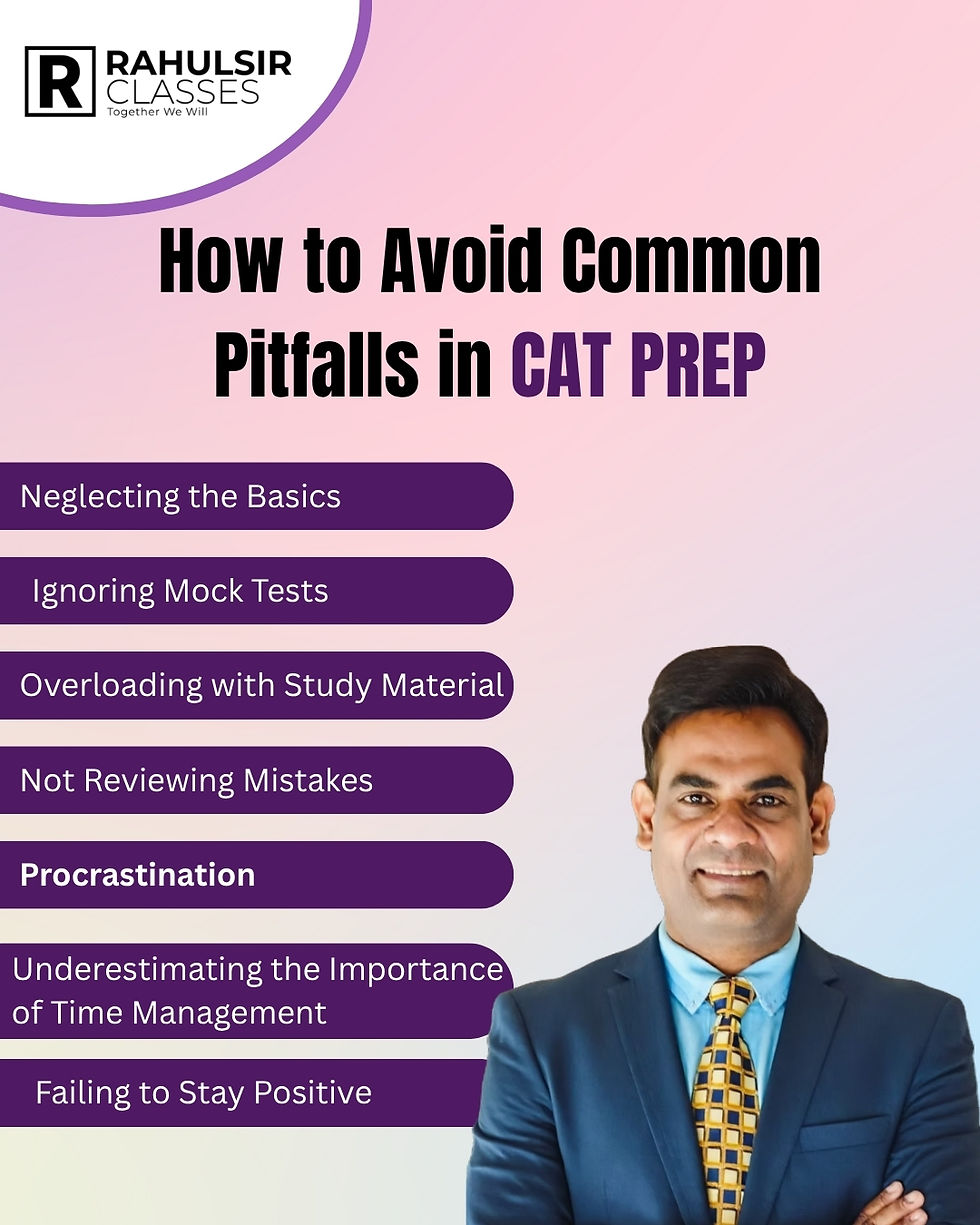How to Avoid Common Pitfalls in CAT Prep
- rahulsirblogs2
- Sep 25, 2025
- 3 min read
Preparing for the CAT exam is a challenging journey that requires focused effort, strategic planning, and time management. However, many aspirants unknowingly make common mistakes that can hinder their performance. Rahul Sir, an expert in CAT preparation, highlights key pitfalls to avoid and shares his approach to overcoming them.

1. Neglecting the Basics
One of the biggest mistakes aspirants make is diving into complex problems without mastering the basics. Rahul Sir stresses the importance of building a solid foundation before tackling tougher topics.
How to Avoid It: Start by revising fundamental concepts of Quantitative Aptitude (QA), Verbal Ability and Reading Comprehension (VARC), and Data Interpretation and Logical Reasoning (DILR). This will give you the confidence to handle difficult questions as you progress.
2. Ignoring Mock Tests
Many candidates focus solely on studying theory and neglect the importance of mock tests. Rahul Sir emphasizes that mock tests are vital for simulating the real exam environment and gauging your progress.
How to Avoid It: Incorporate regular mock tests into your study schedule. Rahul Sir advises taking at least one mock test every week and analyzing the results thoroughly.
3. Overloading with Study Material
Another common pitfall is overloading oneself with study material. Too many books and resources can overwhelm and confuse aspirants, leading to inefficient preparation.
How to Avoid It: Rahul Sir suggests sticking to a few, high-quality study materials that cover all essential topics. Consistency is more important than quantity.
4. Not Reviewing Mistakes
A common mistake is not reviewing errors made during practice sessions or mock tests. Understanding where you went wrong is key to improving your performance.
How to Avoid It: After every mock test or practice session, take time to review your mistakes. Identify patterns in your errors, and focus on those areas in your subsequent study sessions.
5. Procrastination
Many students delay their studies, believing they have more time than they actually do. Procrastination is a serious threat to consistent progress.
How to Avoid It: Set clear daily and weekly goals for your study. Rahul Sir recommends breaking down large tasks into smaller, manageable ones to avoid feeling overwhelmed.
6. Underestimating the Importance of Time Management
Time management is crucial during both preparation and the actual exam. Many aspirants fail to manage their time wisely, resulting in incomplete sections or rushed answers.
How to Avoid It: Practice solving questions under time constraints. Rahul Sir advises allocating specific time limits for each section of the exam and adhering to them during practice.
7. Failing to Stay Positive
Stress and negativity can seriously hamper your progress. If you feel discouraged after a tough session or mock test, it can lead to burnout.
How to Avoid It: Maintain a positive mindset throughout your preparation. Rahul Sir suggests taking breaks, meditating, and staying motivated by celebrating small milestones.
Conclusion
Avoiding these common pitfalls is crucial for your success in the CAT exam. By focusing on the basics, taking mock tests, reviewing mistakes, managing time, and maintaining a positive mindset, you’ll be on the right path toward achieving your goals. Rahul Sir’s methods are designed to help students avoid these obstacles and stay on track.
Call to Action
Ready to avoid the common pitfalls and ace your CAT exam with ease? Join Rahul Sir classes today and gain expert guidance to streamline your preparation for CAT 2025. Take the first step toward success!
FAQs
Q1. How many mock tests should I take for CAT prep?
Sol: Rahul Sir recommends taking at least one mock test every week and gradually increasing the frequency as the exam date approaches.
Q2. What should I focus on in the first few months of preparation?
Sol: Focus on building a strong foundation by revising key concepts and gradually increasing your problem-solving skills.
Q3. How can I stay motivated during my preparation?
Sol: Rahul Sir advises maintaining a positive mindset, setting achievable goals, and taking regular breaks to keep motivation high.
Q4. How can I improve my time management skills for the exam?
Sol: Regular practice under timed conditions is essential. Rahul Sir suggests creating a time management strategy for each section of the exam.
Q5. Is it necessary to study from multiple resources?
Sol: Not really. Rahul Sir emphasizes quality over quantity. Stick to a few trusted resources and revise them thoroughly.



Comments